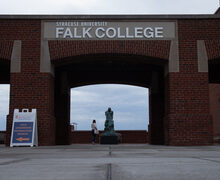Asian, Asian American students grapple with hate crimes
Elizabeth Billman | Asst. Photo Editor
The Center for International Services on Thursday hosted a forum for Asian students.
Editor’s note: This article details the usage of racial slurs.
Fengzhang Wang was confused when she got an email about racist graffiti and vandalism against black and Asian people in Day Hall.
“I thought it was just a conflict between people and not a cultural thing because the wording was not very clear,” she said.
Two days later, she received another email. Then another. And another. At least 10 hate crimes and bias-related incidents have been reported since Nov. 7. Half of those 10 incidents were directed toward Asian people. Other incidents targeted black and Jewish people.
Confused. Frustrated. Angry. These were ways in which Asian and Asian American students described their feelings about their community’s response to the incidents. Whether it is publicly or privately, students within the Asian community have been moving in various ways to make their voices heard.
Leaders and members of Asian organizations met with Chancellor Kent Syverud and other university officials on Friday at the Center for International Services. Students of those organizations were first notified of the meeting via email. There, members of the Chinese Student and Scholars Association presented the chancellor with a list of demands for the university.
The list outlines nine demands for SU, including restructuring the SEM 100 course, rewriting the university and DPS’ policy on hate speech and racial bias, and hiring more counselors to represent minority students.
Their demands follow the original demands of #NotAgainSU, a movement led by black students. The group has occupied the lobby of the Barnes Center since 10:30 a.m. on Wednesday. The sit-in began in response to the racist graffiti found in Day Hall.
Syverud agreed to install more security cameras around dorms and hire more security personnel, several students told The D.O.
In history, Asian activists are very unknown. So, maybe we could educate people to show that we are not the first ones to advocate, but we shouldn't be the last people to act.Bessie Chen, sophomore environmental engineering major and culture chair for ASIA
Sebastian Burns, vice president of the Filipino Student Association, attended the meeting on Friday. He said improving systems for reporting bias and expanded mental health services were important points to bring up in light of the recent incidents.
“I don’t think it was very concrete, but then again, I don’t think anyone was expecting it to be,” Burns said.
Ruth Chen, a professor of practice in the School of Engineering and Computer Science and Syverud’s wife, was present at the meeting. Chen met with students for more than an hour.
Chen addressed problems of inclusion of international student groups on campus, especially those from Asia, Burns said. For the most part, she listened to testimonies and demands from students at the meeting.
“I found the forum to be productive, the participants were courteous and respectful and the dialogue was positive, constructive, and solutions oriented,” Chen wrote in an email statement to The D.O.
Some demands presented to Syverud echoed sentiments made by students at a forum for Asian students hosted by the Center for International Services on Thursday. Among the officials at the meeting were the center’s director Juan Tavares, Chief Diversity and Inclusion Officer Keith Alford, Interim Provost John Liu and Vice President of the Student Experience Rob Hradsky.
Emma Peca, a junior political science major, said that, while the forum was tense, representation from the Asian community was strong.
“I’m a junior, and I’ve never seen that many Asians in one place on campus,” Peca said. “It was empowering to see so many students speak out, especially international students, who I think are really forgotten.”
The lack of Mandarin-speaking health services employees was a central point of conversation at the forum. Students asked for more counselors from marginalized communities.
Fengzhang, a senior from Beijing, previously worked as a peer adviser for the Center of International Services. She said the center should provide students with proper outlets to share any negative experiences at SU. Fengzhang also mentioned that peer advisers should be trained on how to handle incidents of racial bias.
“If they could offer some sessions and individual meetings with students that might be helpful,” Fengzhang said. “I feel like a lot of international students only go to (CIS) when they need to have forms signed or something.”

The protest began at 10:30 a.m. on Wednesday. Anya Wijeweera | Staff Photographer
Some public displays of solidarity and open conversation for Asian students have occurred on campus.
Asian Students in America, Society of Asian Scientists and Engineers at SU and Filipino Student Association held their annual Friendsgiving event on Friday. While regular festivities continued at the event, members of ASIA gave a short presentation on Asian activism throughout United States and Syracuse history.
Bessie Chen, a sophomore and culture chair for ASIA, said the club hoped to educate and inspire its members to stand against racist incidents toward Asian people.
“In history, Asian activists are very unknown,” said Bessie, who holds no relation to Ruth Chen. “So maybe we could educate people to show that we are not the first ones to advocate, but we shouldn’t be the last people to act.”
During their presentation, executive board members touched upon historical moments of oppression toward Asian people in the U.S. Those events included Japanese Internment and “yellow peril,” which references societal fears around Chinese immigration in the late 19th century.
ASIA also mentioned past incidents of racism toward Asian people in Syracuse. In 1997, six Asian or Asian American students and one white student were denied service at a Denny’s on East Erie Boulevard. Later, they were beaten by a group of white men in the parking lot. Other details surrounding the incident are unclear, but the confrontation sparked national outrage.
Yanan Wang, president of ASIA, said the organization is trying to encourage more participation in the #NotAgainSU movement.
“The biggest problem is that us Asian and Asian Americans aren’t showing up and aren’t using our voices,” Yanan said.
“Those slurs are not just towards students. They’re towards everyone. I’m asking the administrators to join us. You’re Asian too,” one student says to Wei Gao, assistant director for international student orientation in the Office of First-Year and Transfer Programs.
— Amy Nakamura (@nakamura_amy) November 15, 2019
After the Friendsgiving event, members of the organizations attended the #NotAgainSU sit-in. A post to the Instagram account @syracuseconfessionwall, an anonymous confessions page for Chinese students, called for students to speak out on the incidents through means other than WeChat and to participate in the Barnes Center sit-in.
“I’m glad our social media presence is that powerful because it shows a connected student body, but at the same time, I also don’t feel like we should be putting in that much work,” said Abigail Ramos, president of FSA.
“This is such a big crisis, I feel like the university should be doing more to provide resources and information to what students can do to voice their opinions,” she said.
Some students have acted on their own terms and joined the sit-in. Students have taped signs in Chinese, Japanese and Vietnamese to the walls of the Barnes Center lobby. Jingwen Zhang, a junior, said she wants to see more Asian students present in person, not just online chat groups.
“I’ve been at Syracuse for three years now, and so I feel like Syracuse is our second home for these past few years,” Zhang said. “So, when they want us to go back to China, it hurts.”
Zhang and a group of friends attended the sit-in on Saturday night, holding signs that read, “It’s our turn #NotAgainSU” written in English and Chinese. Online, other students have taken to Instagram and WeChat to post messages of support the movement.
“This city is so cold,” Zhang said. “And we cannot handle anymore coldness from other people.”
Published on November 18, 2019 at 1:34 am
Contact Amy: [email protected]






